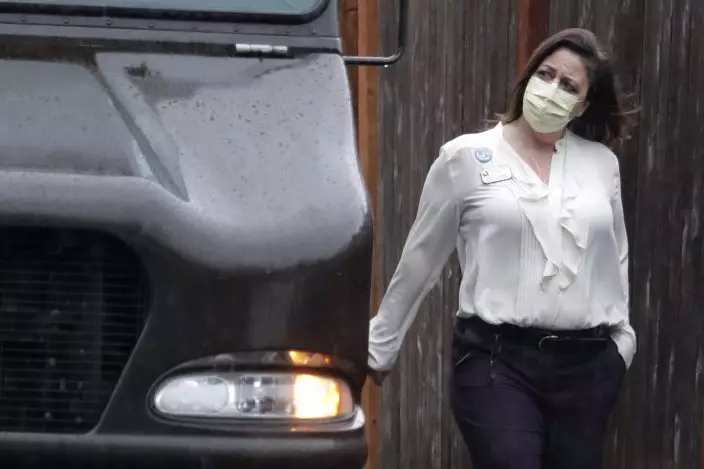President Donald Trump persisted Monday in making false assurances about U.S. preparedness for the coronavirus outbreak and the prospects for a quick vaccine, or even cure.
In remarks at the White House and an evening rally in North Carolina, Trump reached for silver linings as the number of cases and deaths in the U.S. grew.
TRUMP: “We're talking about a vaccine. Maybe a cure is possible. But we're talking about a vaccine and they're moving along very quickly, all of the pharmaceutical companies, are moving along very quickly.” — remarks before a meeting with Colombian President Iván Duque..

A worker at the Life Care Center in Kirkland, Wash., near Seattle, wears a mask as she walks near a UPS truck during a package delivery, Monday, March 2, 2020. Several of the people who have died in Washington state from the COVID-19 coronavirus were tied to the long-term care facility, where dozens of residents were sick. (AP PhotoTed S. Warren)
TRUMP: The U.S. may have a vaccine “relatively soon” and “something that makes you feel better ... sooner." — rally.
THE FACTS: That's misleading, given the far more cautious pronouncements of federal public-health officials and scientists. They say a vaccine is probably more than a year away at best and there are no special treatments for COVID-19. The notion of a quick “cure” is not in their vocabulary as they focus on trying to help people avoid getting the disease in the first place.
What’s actually happening: Studies have begun in COVID-19 patients in parts of the world to see if certain antiviral medications could help treat the infection.
Today, there are no proven treatments. In China, scientists have been testing a combination of HIV drugs against the new coronavirus, as well as an experimental drug named remdesivir that was in development to fight Ebola. In the U.S., the University of Nebraska Medical Center also began testing remdesivir, in some Americans who were found to have COVID-19 after being evacuated from a cruise ship in Japan.
It's not known how soon such studies will answer whether any of the drugs help. And many patients recover without needing any treatment. The biggest concern is how to help the fraction who become severely ill.
TRUMP: The U.S. is “ranked by far No. 1 in the world for preparedness” -- rally.
THE FACTS: Not “by far.”
He's referring, as he did explicitly last week, to a report coauthored by Johns Hopkins Centers for Health Security. Hopkins experts on Monday said the U.S. got a “grade” that overall was highest by a few points among other high-income countries -- Britain, Canada, Australia, countries in northern Europe -- that are all at about the same level of preparedness.
But the report’s overall finding: “No country is fully prepared for an epidemic or pandemic,” cautioned Hopkins’ Jennifer Nuzzo, who coauthored the report.
It’s difficult to say from the report that a country that scores 2 points higher than another is going to fare much better, she added.
Now that the new coronavirus is spreading around the world, Nuzzo’s biggest concern is the readiness of health care systems around the globe. There’s been a lot of work in recent years to shore up public health capacity and strengthen laboratories and surveillance for dangerous new outbreaks.
But she said her report uncovered that few have paid attention to whether they have enough doctors and nurses, if those workers are seeing patients in a way that’s safe and if they have enough of the masks and other gear to safely do their jobs.
“We have seen time and time again in outbreaks that systems, that health systems that are unprepared often serve as points that amplify transmission to the community,” she said.
In the U.S., the biggest worry is access to that health care. “If fear of the cost of health care is a deterrent, that could create a bad situation where people stay at home, potentially infecting others.”
AP Medical Writer Lauran Neergaard contributed to this report.
EDITOR'S NOTE — A look at the veracity of claims by political figures.
Find AP Fact Checks at http://apne.ws/2kbx8bd
Follow @APFactCheck on Twitter: https://twitter.com/APFactCheck


